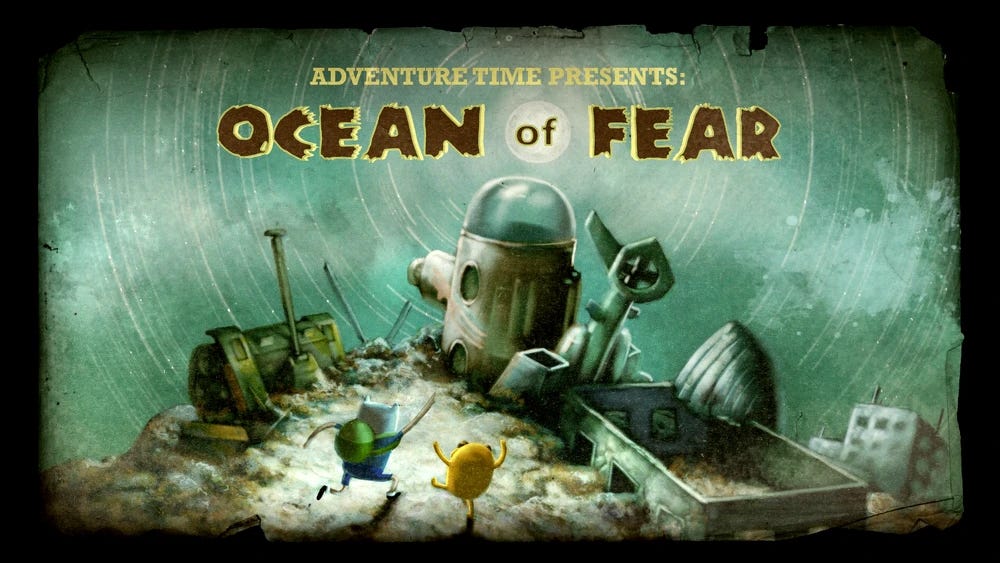If this is your first time seeing one of these, you’re welcome to hop in and give it a go, or you can start with the first one.

This is the sixteenth episode in a series designed for absolute newbies to meditation or for those who really want to focus on the basics. This track includes ten minutes of meditation practice; if that feels like a lot to you, maybe start at the beginning!
Turn on the TV, get comfy, and play this track after you’ve watched the episode: Ocean of Fear (Season One, Episode Sixteen).
P.S. If you’re curious, here you can find out why I started this project.
Recording Transcript (Meditation Begins at 5:53)
Good day, friend. Thanks for joining me again for this time of facing our fears and exploring our inner depths.
I hope that this process doesn’t feel so painful as hitting your own head with a wrench to end up at the bottom of the ocean, but maybe it does, and I if it does, then an extra thank you to you for sticking with this.
But for many of us, even with something as simple as focusing on the breath, meditating can be kinda scary or uncomfortable. It requires us to lower a good deal of our defenses. We are often more acclimated to going through our day one event after another, letting our mind go to wherever it takes us. And we often pass judgment on ourselves and our thoughts, and meditation invites us to put that aside, to just be present, to experience reality on reality’s terms, which can sound really horrifying and daunting, particularly in a world that I think for many of us appears increasingly unhinged and perhaps untrustworthy.
So it may seem simple, but encountering yourself in meditation, breath by breath, and feeling into your body, is actually a tremendously brave thing for one to do. And you don’t have to overcome your fears entirely on order to do this, you can accept that there is difficulty or friction, you can welcome those parts of yourself.
Often, the impulse to move out of our bodies and into our minds, or to respond fearfully to our circumstances, are the consequences of trauma and past difficulties. We perceive the environment around us as threatening, even if in this moment, everything is perfectly fine, because before this moment, we have experienced how difficult and scary life can be. Some of us more than others, but we’ve all experienced this. In this way, our fear response, as frustrating as it may be, as closed off as it may make us, is actually a coping mechanism that has served us well at some point in the past. It is our body and mind trying to keep us safe from reality, and it’s actually really good at that, humans are incredibly resilient in that way.
But for many of us, these coping mechanisms stack up and it can soon feel like we’re fighting ourselves, like we’re out of control, like we’re too caught up in anxiety and fear and trauma to be present for our lives and the people we love in the ways we would like to be. And I don’t believe that meditation alone can undo all of this, at least, not for all of us and certainly not overnight. But I do think it can help us to become more aware of it, and in my experience, it can actually undo a good bit of it. And meditation can lead us to other strategies for healing, somatics, therapy, any number of things.
But it’s important that we allow our defenses to drop on the timetable that they would like to. Hitting ourselves over the head, or denying the reality of our fears, or pulling all our determination to the front to try to overcome them risks re-inscribing trauma. You may overcome your fear in the short term, but if that short term overcoming crosses a line from challenging to outright harmful, the process of healing can be set back.
Which isn’t to scare you, simply to encourage you to listen to your body. If the breath is too triggering for you, try touch points. If a particular meditation is super painful, feel free to skip it. If meditation in general is not helping create a change that is welcome, then put it down and try something else or try again later.
This is not to suggest that the process will be exclusively rosy, indeed, opening to painful feelings and learning to be present for them is a part of any healing process. And often times as things begin to shift inside us and in our perspective, they can feel uncomfortable or challenging or painful before they begin to resolve. Because we become more attentive to our lives through meditation, we also become more attentive to the pain and difficulty in our lives, we aren’t just opening up to the bliss. We can’t. But we also gain greater perspective, more space for all of our feelings, a more acute understanding that all of our feelings change and pass, good and bad.
So there is a fine line between challenging but constructive and too painful and traumatic. Only you can decide what this is, but I encourage you to be gracious with yourself. You don’t have to do this perfectly. And you can’t know all of your boundaries without exploring them. Whatever you experience; remember that you are not alone. And there are many other resources for support if ultimately you decide that this feels too much like knocking yourself unconscious just to face your fear.
And, as our episode reminds us, we don’t have to overcome all of our fears to be heroic, to be a source of good and light, or to be worthy of love from ourselves and those around us. The best you can do is enough. And it’s a wonderful gift, to yourself, to those around you, to me, and to the world.
So let’s get started.












Share this post